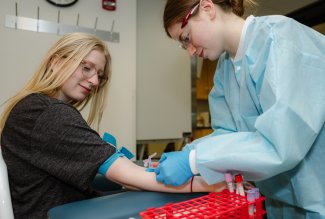
Health care institutions throughout the nation, including regionally, continue to be in desperate need of nurses and laboratory scientists. Meeting and mitigating these challenges are Ohio Northern University’s Nursing and Medical Laboratory Sciences (MLS) programs, which are providing highly skilled graduates who are not only trained to hit the ground running from day one, but are empowered to make the best decisions for themselves and for the wide range of patients they serve within an exceedingly demanding work environment.
ONU’s health care program directors and national professional organizations are quick to point out just how significant the dearth of workers is. While a worker shortage has been recognized as an ongoing issue for years, the pandemic, which strained heath care resources in multiple ways, accelerated the problem. According to ONU Nursing Director Kami Fox, the nursing shortage in the U.S. could reach more than 1 million by the end of this year. As the baby boomer generation ages and the need for health care services grows, workers are more in demand than ever.
The U.S. is also experiencing a lab scientist shortage for reasons similar to nursing. Too few educational programs, retirements, burnout and a general lack of knowledge about the profession are the primary culprits, says Dr. Lisa Walden, MLS Program director. “A recent article indicated that in order to meet demand, educational programs should graduate 12,000 students per year. The United States is graduating just 5,000,” she maintains.
Walden says the worker shortage “is affecting local and regional institutions, including those that ONU partners with for MLS clinical experiences.”
According to Burlin Sherrick, vice president of ancillary services at Lima Memorial Hospital and an adjunct instructor for ONU’s blood bank course, as many as 40% of lab technician positions in the area remain unfilled.
To address the gap, some health care organizations are more aggressively recruiting existing students with monetary incentives for schooling. A Sept. 22, 2022 Cleveland.com story indicates Ohio offers nursing students $1,620 per year to help pay for a BSN degree, while Michigan is forgiving up to $200,000 in student loans for nurses who work for two years. Walden says sign-on bonuses for laboratory scientists can also be lucrative. For 2022 MLS graduates, many labs are providing $10,000 sign-on bonuses that come with a two-to-three-year employment commitment, she notes.
Meanwhile, many college health care programs are rejecting qualified applicants because they don’t have the resources to teach all of them. Thousands are still heeding the call to care for those with healthcare needs, but the nation’s educational infrastructure remains inadequate. Cleveland.com wrote that “the Ohio Board of Nursing reported in 2021 that over 4,000 degrees were awarded by the state’s 45 accredited BSN programs, yet over 4,000 qualified applicants were also rejected. Six schools turned away more than 200 applicants each, and the University of Cincinnati turned away more than 1,000.”
Rejection of qualified applicants isn’t happening at ONU, where the win-win is evident: students benefit from a superior educational experience and then have their pick of jobs that in some cases are paying more than ever. The U.S. Bureau of Labor Statistics reported the median annual wage for RNs in 2021 was $77,600 and was $57,800 per year for clinical laboratory technologists and technicians. Some employers are offering thousands of dollars in sign-on bonuses.
MLS Program facts:
· 100% graduation rate during the past five years.
· 100% placement rate during the past five years.
· 90% passage rate, within one year of graduation, on the ASCB Board of Certification Exam.
· Of the seven NAACLS-accredited programs in Ohio, ONU is the only private institution.
· Extensive on- and off-campus lab experiences, learning sessions with area professionals, and attendance at the Ohio ASCLS Collaborative Laboratory Conference.
· Affordable tuition at $3,245 per semester.
· For those who have already earned a bachelor of science degree, the MLS post-baccalaureate certificate program allows individuals to earn MLS credentials in just one calendar year.
Nursing Program facts:
· 92.8% passage rate during the past five years on the national licensing exam for registered nurses.
· 100% placement rate the past three years of graduates seeking full-time employment or who applied for graduate school within six months of graduating.
· Rated the 7th best nursing program in Ohio by RegisteredNursing.org.
· $52,586 is the average starting salary for ONU nursing graduates.
· Direct admission as a nursing major.
· Clinical rotations begin sophomore year. Students complete approximately 810 hours total of clinical rotations.
For more information about ONU’s Nursing Program, visit https://www.onu.edu/academics/nursing.
For more information about ONU’s Medical Laboratory Sciences Program, visit https://www.onu.edu/academics/medical-laboratory-sciences